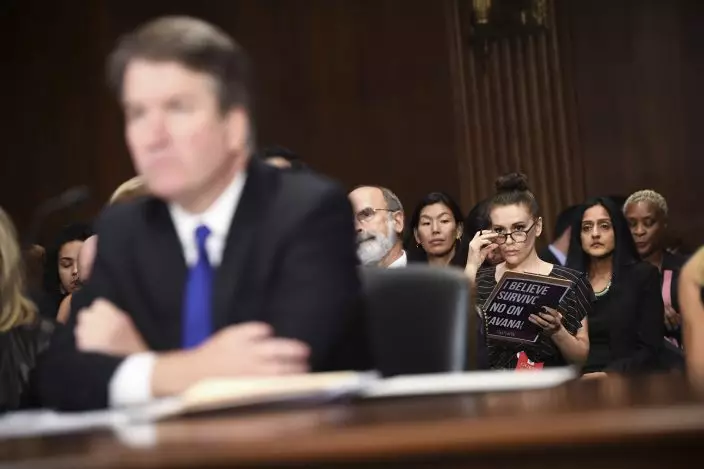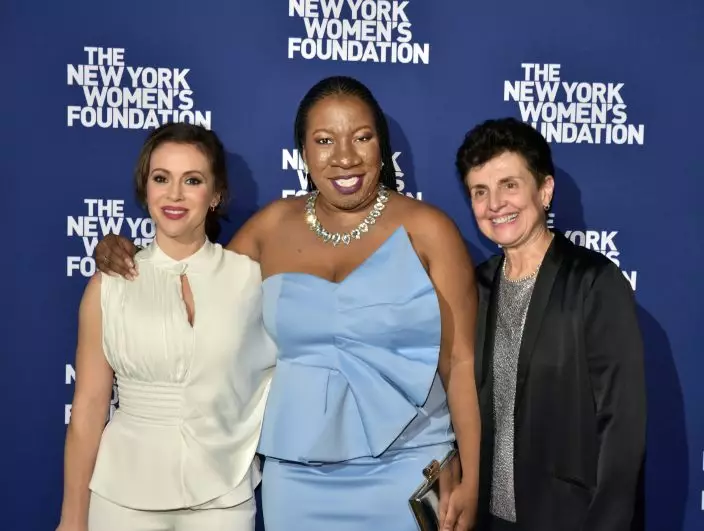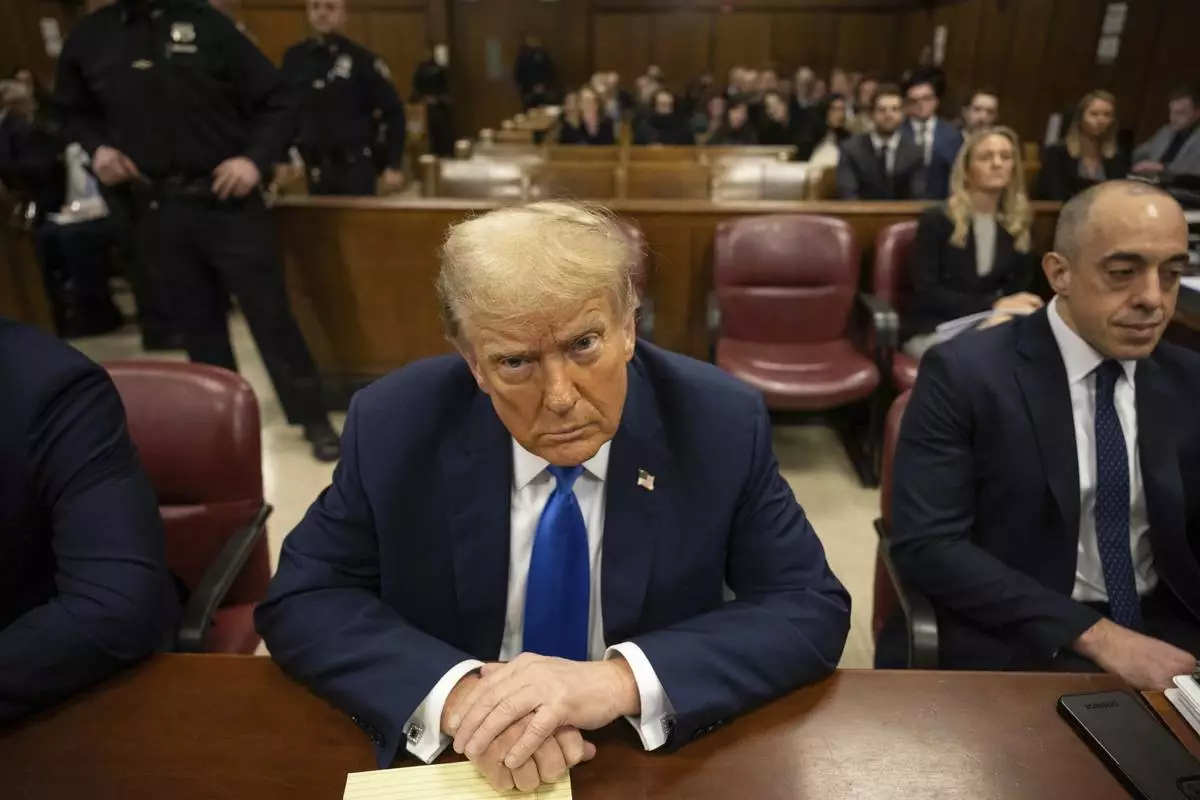By the end of her impassioned speech last week in front of a crowded hotel ballroom, Alyssa Milano was choking back tears.
The words "Me Too," the actress and activist told her audience, would continue to ring out as long as society needed them, "reverberating off every closed door, bouncing off every glass ceiling."
"This movement is not going anywhere," she declared, "until our work is done."

FILE - In this Sept. 27, 2018 file photo, actress and activist Alyssa Milano listens as Supreme Court nominee Brett Kavanaugh testifies before the Senate Judiciary Committee on Capitol Hill in Washington. Now that the #MeToo movement has passed the one-year mark, key voices in the movement are assessing progress and looking forward to the next phase. For actress Milano, it's about winning the cultural battle, despite a perceived setback with the confirmation of Brett Kavanaugh confirmation to the Supreme Court. (Saul LoebPool Photo via AP, file)
Offstage stood activist Tarana Burke, who had just presented Milano with her award from the New York Women's Foundation. It had been exactly a year since Milano had sent her famous "Me Too" tweet, echoing an expression Burke had coined more than a decade earlier, and awakened the next morning "to a different world," in Burke's words.
Now, the two women, and others associated with the movement, are assessing progress, looking ahead, and trying to decide what's next, a year after the scandalous Harvey Weinstein allegations exploded into public consciousness.
It's also a moment when some are speaking of so-called "setbacks" to the movement. Earlier this month, a New York judge dropped one of the sexual assault charges against Weinstein, amid accusations of misconduct by a detective in the case. And there was the confirmation of Judge Brett Kavanaugh to the Supreme Court despite an allegation of sexual assault from accuser Christine Blasey Ford, which he denied, and the explosive hearings and protests that accompanied the ordeal.

This Oct. 15, 2018 photo released by the New York Women's Foundation shows, from left, actress and activist Alyssa Milano, founder of the Me Too movement Tarana Burke and Ana Oliveira at The New York Women’s Foundation’s 2018 Radical Generosity gala in New York. Now that the #MeToo movement has passed the one-year mark, key voices in the movement are assessing progress and looking forward to the next phase. (Annie WattThe New York Women’s Foundation via AP)
"I'm just glad we're no longer fighting that battle," Milano, who attended the hearing in solidarity with Ford, said in an interview, "because I think we all need to take a moment to breathe, assess the situation, heal a little bit, and think about what comes next."
What does come next? For Milano, the key battleground is the cultural one. "We obviously lost the political battle with Kavanaugh, we might be losing the legal battle with Harvey, but I think that we're constantly striving to win the cultural battle, and sometimes that has to happen first," she said. "So I still have a lot of hope. I don't think that there's any real movement that's linear. I always say, '(Expletive) is gonna get broken.'"
Also preferring to see the glass half full is Debra Katz, who was already one of the nation's most prominent attorneys in the arena of sexual assault and harassment litigation when she gained instant recognition as Ford's attorney.
Though the outcome of that case was obviously not what she'd hoped, "I think anytime the world listens to four hours of someone's testimony and gives rapt attention to the experiences of a sexual assault survivor, the world is transformed," Katz said in an interview.
"And that was a direct result of the power of this movement. I do believe significant progress has been made, and will continue to be made."
But Katz, who declined to comment specifically on her representation of Ford, said it's obvious that certain institutions "have not kept pace with the cultural shift that we're experiencing. Congress continues to be deeply flawed, and the majority at these hearings had a foregone conclusion. But I don't think that's a failing of the movement."
What's in the future? First of all, more legal cases. Attorneys like Katz are busier than they've ever been, due to increased willingness of women to come forward. And they're finding, she says, that employers are much more receptive to resolving cases.
"What I've seen that feels very different, as a lawyer who's handled this type of case for more than 30 years, is that companies are acting more promptly and taking claims more seriously, and actually terminating wrongdoers even if they're at the highest levels of corporations."
On top of that, Katz says, there's a growing recognition that current laws governing workplace sexual harassment are inadequate, with standards of proof that too high, and damages too low — all impediments to bringing a case.
"There's nothing promising being done in Congress, so we see many states acting to fill those voids," she says. "Important things are happening legislatively that will lead to greater rights and protections in the workplace."
A number of states, spurred by the revelations of the #MeToo movement, have introduced or enacted legislation that goes beyond current federal regulations on workplace sexual harassment. Much of it has been concerned with limiting or banning non-disclosure agreements or forced arbitration; several states have already enacted such legislation. Legislation has also been introduced in some states that would require sexual harassment training for employers and employees.
Policy is also on Milano's mind; she's been advocating for a new push to pass the long-stalled Equal Rights Amendment. She also calls for school curriculums to include gender equality for a young age. And she says there needs to be more participation in #MeToo from a key constituency: Men.
"It's frustrating that more men haven't offered to be part of the movement," she says. "Because women are really at the forefront of every movement, lending their support." At the awards dinner, she told men: "We can't do it without you."
For Milano, even criticism of the movement can be a force for progress. "Bring it," she says. "Because for me, the criticism is where we have the meaningful conversations." Part of the blowback has included the #HimToo hashtag, popularized during the Kavanaugh controversy, in which people express concerns about men being unfairly targeted by false assault claims. (Advocates say sexual assault is underreported, not overreported.) First lady Melania Trump also said recently that women "need to show the evidence" before coming forward with sexual misconduct claims.
To Burke, who coined "Me Too" in 2006 to raise awareness of the pervasiveness of sexual abuse, much of the back-and-forth has been a distraction from the real point of it all: Helping survivors of sexual violence.
She's been spending recent months beefing up the resources and programming at her own group, "me too.," which works with survivors in marginalized communities. Helped by funding from the women's foundation , the Brooklyn-based group has recently expanded its digital support network with the aim to be a major national resource. It is also working on training and funding counselors across the country to help survivors in their own communities.
On a broader level, Burke says a key goal, in this second year of the movement, is to redefine "the way we think about victory." This is not, she says, a tennis match.
"I think so many people are watching this like it's, 'a point for #MeToo, a point for the other side,'" she says. "It's not a tennis match and it's not a sprint. It's a marathon. We're talking about a greater body of work than just Harvey Weinstein going to jail."
And Burke has been buoyed by the fact that with every new challenge, more supporters join her struggle. "Every time we go out, every time we march, every time we rally, we bring new people into the fold, and we embolden the people who are already here," she says, citing the recent anti-Kavanaugh protests in Washington.
Katz, too, finds reason for hope in the numbers — and demographics — of people becoming active in the movement.
"The fact that we're even having a national dialogue about sexual assault in schools and you're seeing young girls organizing, with petition drives and conversations — all that is significant progress," the attorney says.
"And it's not going to happen overnight. It's going to be a long and protracted battle, but I think the energy has been unleashed by this #MeToo movement. We're not going to continue to be silent."










